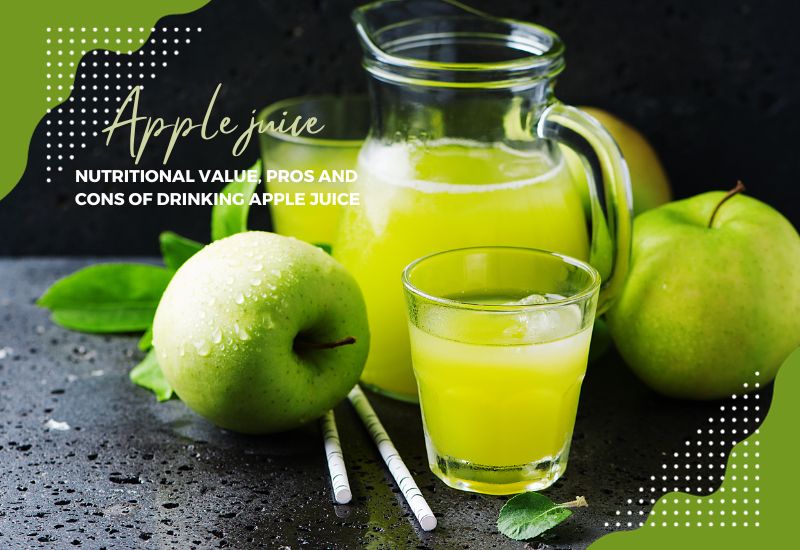When apples are juiced, their hydrating quality is maximized, and some plant compounds are retained. However, juicing reduces other benefits of whole apples, including fiber and the ability to satisfy hunger. The downsides of apple juice include reduced fiber content, decreased hunger satisfaction compared to whole apples, increased sugar concentration, limited nutritional variety, and the potential for dental issues due to the natural sugars in the juice.
Apple juice is made by crushing and pressing apples. The juice is then clarified to remove certain substances and pasteurized before packaging. In some cases, the liquid may be concentrated through dehydration processes.
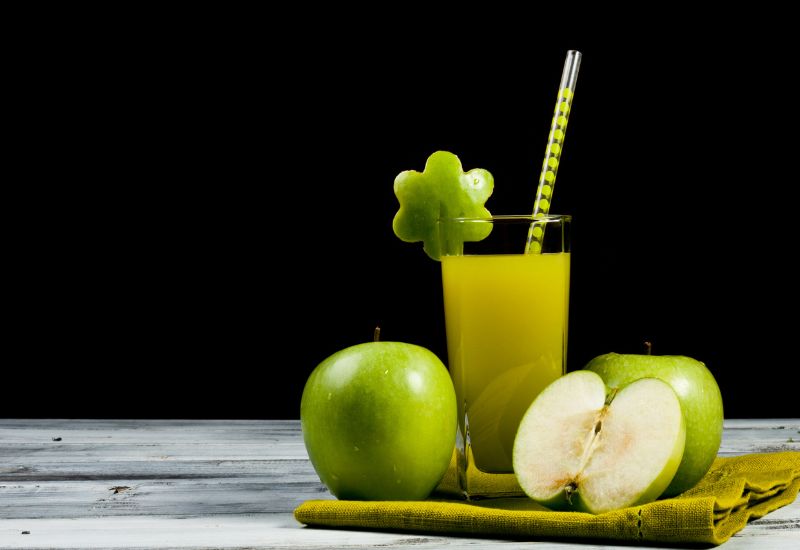
Nutritional Value of Apple Juice
The nutrients present in apple juice are as follows:
| Nutrient | Amount per 100 grams | % Daily Value |
|---|---|---|
| Calories | 46 | |
| Total Fat | 0.1 g | 0% |
| Saturated Fat | 0 g | 0% |
| Cholesterol | 0 mg | 0% |
| Sodium | 4 mg | 0% |
| Potassium | 101 mg | 2% |
| Total Carbohydrate | 11 g | 3% |
| Dietary Fiber | 0.2 g | 0% |
| Sugar | 10 g | |
| Protein | 0.1 g | 0% |
| Vitamin C | 1% | |
| Calcium | 0% | |
| Iron | 0% | |
| Vitamin D | 0% | |
| Vitamin B6 | 0% | |
| Cobalamin | 0% | |
| Magnesium | 1% |
What Does Apple Juice Contain?

Whole apples are nutritious and beneficial for weight loss, heart health, and reducing the risk of diabetes. However, juicing may diminish these benefits as the flesh and skin of the apple contain most of the nutrients. Nevertheless, apple juice still offers some advantages to the body.
The pros and cons of drinking apple juice are as follows:
Pros:
- Hydration: Apple juice is 88% water and easy to consume. It is a popular choice for hospitals to serve patients after medical procedures as it is gentle on the stomach and does not cause nausea.
- Plant compounds: If the juicing process retains some apple flesh (e.g., cloudy store-bought apple juice or homemade juicing), the resulting juice may contain plant compounds that protect cells from inflammation and oxidation damage.
- Heart health: Apple juice with some flesh included may help lower bad cholesterol (LDL) buildup in arteries, promoting better blood flow to and from the heart.
Cons:
- Weight gain: Apple juice is easy to consume, leading to potential overconsumption of calories due to dehydration or taste preferences. Unlike milk, apple juice does not provide a feeling of satiety.
- Insufficient vitamins and minerals: Store-bought apple juice provides less than 10 percent of your daily nutrient intake. Look for apple juice fortified with vitamin C for additional nutrients, but for a more substantial nutrient intake, eating a whole apple is the best option.
- High sugar content: Many store-bought apple juice brands contain excessive sugar, which can contribute to weight gain and blood sugar spikes. To avoid this, choose apple juice made solely from 100 percent juice without added sugars. Pairing apple juice with protein and healthy fats can also help mitigate the impact of high sugar content (e.g., having toast with peanut butter alongside a glass of apple juice).
Best Time to Drink Apple Juice
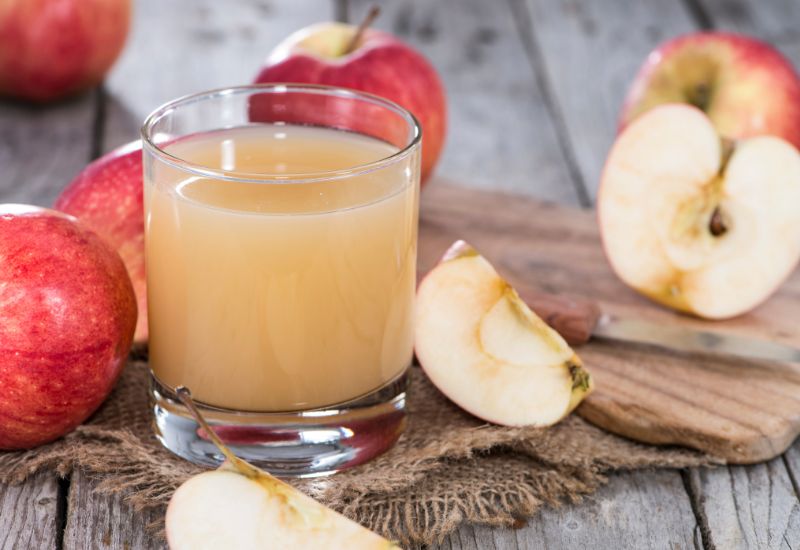
Fresh or store-bought apple juice is best consumed in the daytime, preferably in the morning on an empty stomach, to facilitate quick nutrient absorption after a night of fasting.
To prevent a rapid increase in blood sugar and insulin levels from consuming only apple juice, it is recommended to include a source of healthy fat and protein such as eggs, nut butter, or avocado in your breakfast. If you are concerned about blood sugar regulation, opting for a whole apple instead of apple juice is preferable as the fiber in the flesh and skin leads to a smaller insulin spike than apple juice.
Another suitable time to drink apple juice is before and after exercise. Apple juice provides energy that can boost your workout performance, aiding in carbohydrate burn and reducing abdominal fat. Additionally, apple juice can help restore sugar levels and replenish lost nutrients. However, it is essential to be mindful of the amount consumed, as a glass of apple juice may contain as much sugar as three scoops of ice cream.
Avoid consuming apple juice right before bed, as it can cause a spike in blood sugar, making it difficult to fall asleep and stay asleep. It may also result in frequent trips to the bathroom during the night. Instead, if you are seeking a beverage to promote sleep, chamomile tea or warm milk are good options. If you prefer a bedtime snack, a raw apple can be a suitable choice.
Can I drink apple juice after tea?

There is no inherent problem or issue whatsoever with enjoying a refreshing cup of tea after indulging in the delightful experience of consuming a juicy, crisp apple. In fact, specific individuals may discover this combination to be rather pleasant to the senses.
Nevertheless, it is undoubtedly worth keeping in mind and taking note of the fact that the compounds known as tannins, which are naturally present in tea, possess the potential to impede and hinder the optimal absorption process of non-heme iron. This particular type of iron is primarily found in plant-based food sources, such as the delectable and nutritious apple.
Can I drink apple juice after eating egg?
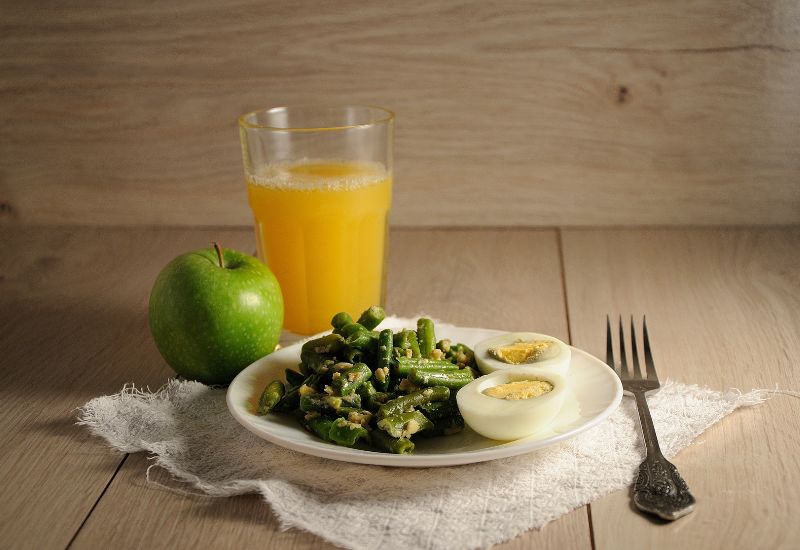
Yes, it is standard to find eggs and fruit juice as a part of the breakfast spread. It is a daily routine to enjoy a refreshing glass of fruit juice alongside a plate of perfectly boiled eggs.
The combination of fruit juice and boiled eggs has been found to have no adverse side effects on one’s health. On the contrary, this delightful pairing provides essential nutrients and a substantial amount of protein, contributing to our overall well-being.
Can we drink apple juice after eating chicken?
Yes, it is absolutely safe to consume a variety of fruits after enjoying a delectable chicken dinner in the evening. Rest assured, you need not worry about any adverse effects on your well-being as there exists no concrete scientific evidence to substantiate any claims that pairing fruits with chicken could potentially pose any threats to your health.
On the contrary, fruits boast an impressive array of essential nutrients and powerful antioxidants that can contribute significantly to fortifying your overall health and promoting a sense of vitality and equilibrium within your body.
Consequently, incorporating the vibrant and flavorsome world of fruits into your post-chicken dining experience can be a sage choice for your holistic well-being.
Can you drink apple juice then milk?

Yes, it is generally okay to drink juice after consuming milk. Many believe mixing dairy products like milk with acidic beverages like juice can lead to digestive issues or curdling.
However, it’s important to note that this belief is not a significant concern for most individuals. In fact, there is no scientific evidence to support the idea that combining milk and juice in your stomach will cause any adverse effects.
Therefore, you can enjoy your glass of milk followed by a refreshing glass of liquid without worrying about any potential digestive disturbances. It’s always a good idea to listen to your body and make choices that work best for you and your preferences.
Can we drink apple juice in empty stomach?
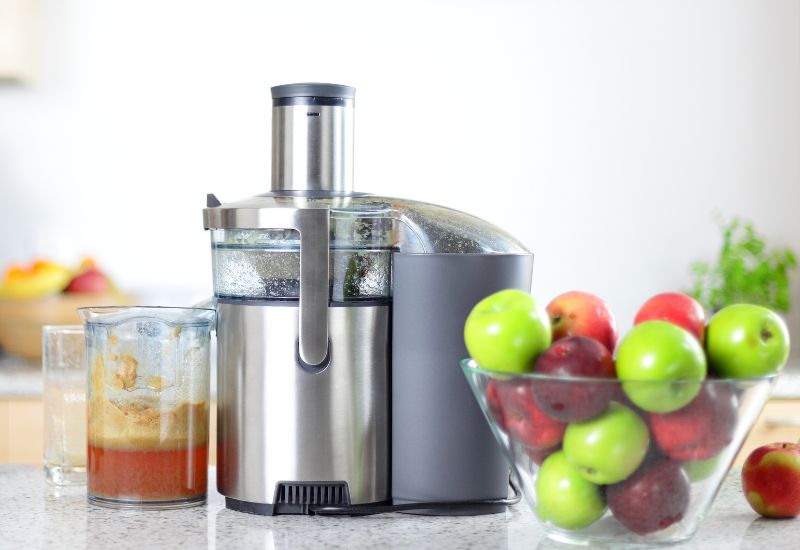
Apple juice, with its high nutritional content, is widely regarded as a beneficial beverage that supports overall health and strengthens the body’s immune system.
Suppose you like this delightful drink and do not suffer from allergies or sensitivities. In that case, it is highly recommended that you incorporate it into your regular routine.
However, it is essential to note that consuming apple juice on an empty stomach may lead to discomfort, as it can contribute to acidity and gas formation.
Therefore, to prevent any potential digestive issues, it is advisable to enjoy apple juice alongside a meal or snack.
Nevertheless, for individuals who do not experience any such complications, indulging in a refreshing glass of apple juice first thing in the morning can be a refreshing way to kickstart the day and provide a burst of natural energy.
Apple juice has benefits like hydration and plant compounds but lacks fiber and satiety. It’s best consumed in the morning or before exercise. Avoid it before bed. Head to Farm to Palms for sweet apples to enjoy whole or as juice for a healthy choice!

